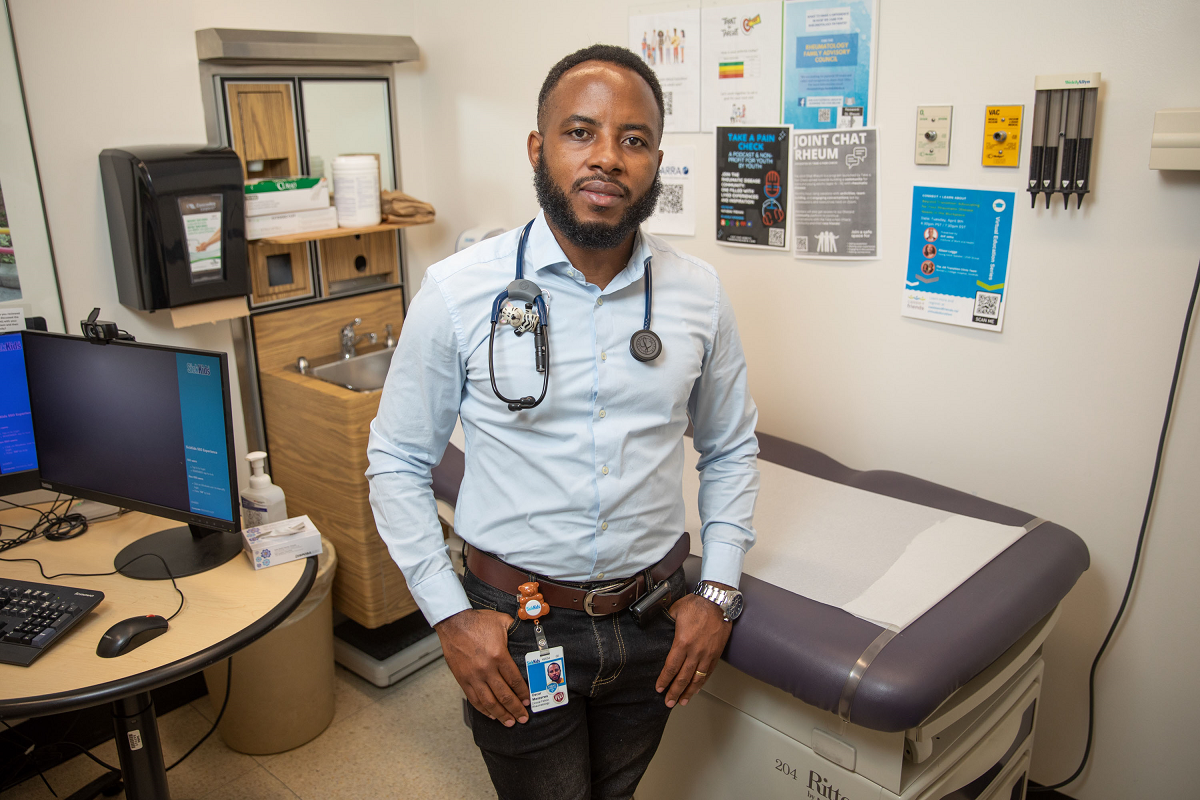Electronic tool helps integrate mental health care in each clinical encounter
Summary:
A new measurement-based care initiative, led by the Mental Health Strategy, is helping integrate mental health care into the care continuum.
A new measurement-based care initiative for mental health at The Hospital for Sick Children (SickKids) is helping integrate mental health into the care continuum. The initiative launched in the Lupus Clinic within the Division of Rheumatology, driven by the Mental Health Strategy.
Lupus is a complex inflammatory condition impacting multiple organs, including the brain, that often presents around the time of puberty — when there is already a lot going on for a young person. These factors, paired with the fact that lupus is a chronic condition, make mental health an integral part of a lupus patient’s care journey at SickKids.
Measurement-based care (MBC) is the repeated assessment of symptoms with the aim of using results to guide care provision and system planning. Part of the new initiative is to use a digital tool to allow for earlier identification and monitoring of mental health symptoms using an MBC approach. The tool, called Voxe, helps capture two mental health patient-reported outcome measures (PROMs)— one for anxiety (GAD-7) and one for depression (PHQ-9).
Because of the impact lupus can have on the mental wellbeing of patients, mental health screening was already taking place in the Lupus Clinic – but it was a paper-based system.
“Each week, we would go through a list of patients coming to the clinic, identify those eligible for screening, then work with a research coordinator to help collect and review questionnaire responses —all on paper,” says Dr. Oscar Mwizerwa, a Fellow in the Lupus Clinic and advocate for the new MBC initiative.

The PROM asked eligible patients voluntary questions about anxiety and depression, and scores were manually calculated and entered into the electronic health record, often towards the end of the appointment. This was a time consuming and onerous task, which was subject to human error.
Using Voxe, an electronic patient-reported outcome measure (ePROM) platform, the team was able to more effectively integrate mental health PROMs into the electronic health record. Voxe enables patients to fill out PROMs on their own devices in the hospital ahead of their appointment. Scores are automatically calculated and appear directly in their medical chart to enable their care team to recommend additional support or resources when needed.
Integrating mental health care across the care continuum
Voxe helps facilitate an efficient and systematic way to incorporate mental health care into care conversations.
“When you can see anxiety and depression scores right on the patient chart before even going into the room, you can better prepare for those conversations,” Dr. Mwizerwa says. “The scores are also colour-coded, meaning at-a-glance you can see who might need more support than others. It makes it much easier to provide patients with any support or resources they might need to care for their holistic wellbeing.”
According to Dr. Mwizerwa, the MBC initiative will benefit many patients, not just patients with lupus.
“Children’s mental health can be disturbed at any time by any stressors. Whether patients have a chronic condition like lupus, or a small fracture – these things disrupt their joy and wellbeing and consequently generate a negative impact on their mental health,” he says.
Dr. Samantha Anthony, Health Clinician Scientist in the Child Health Evaluative Sciences program at SickKids, whose lab created the tool, says advances in digital health are what helped facilitate the implementation of PROMs into clinical workflows through electronic or ePROM systems.
“Voxe emerged in response to both patient and health care provider-identified needs for a platform that engages and empowers patients in their health outcomes, while being systematically integrated into clinic workflows to enhance care provision and outcomes,” says Dr. Anthony. “Informed by our previous research, iterative rounds of design and usability testing guided the rigorous and user-centered development of Voxe.”
A well-integrated system means the potential to change the delivery of care for patients – enabling conversation, allowing patients to feel heard, and for their provider to monitor changes effectively over time. It also helps increase provider comfort and capacity for addressing and managing patients more holistically, which is a key aim of the Mental Health Strategy.
As with anything newly implemented, there are growing pains.
“It’s early and we’re still learning, documenting feedback and adjusting with the MBC team as we go,” says Dr. Mwizerwa. “An important aspect we hope to explore further, is how patients and families are adjusting to this tool and the processes.”
“Overall, I’m pleased to see this initiative start expanding further,” he says. “The potential of MBC expanding to other clinics makes sense as we aim to provide the best comprehensive care for our patients.”

